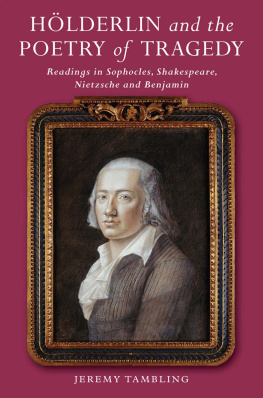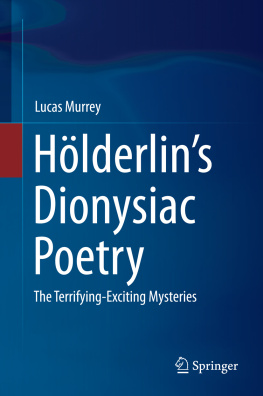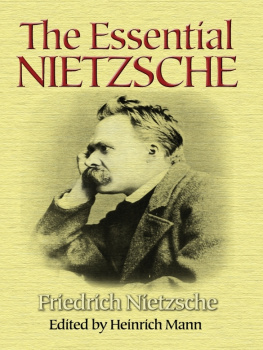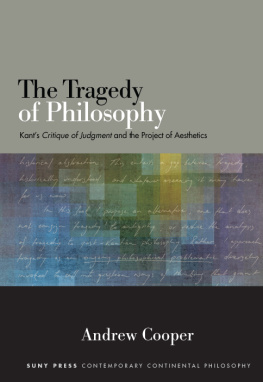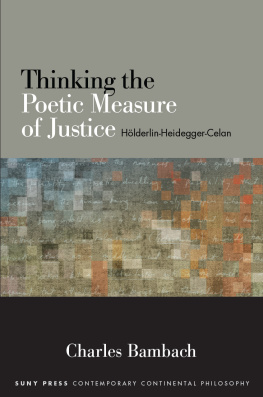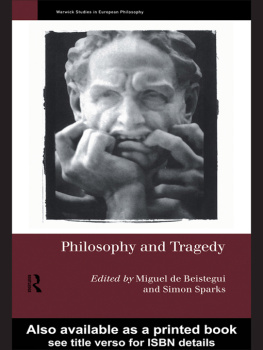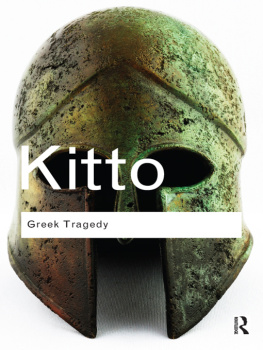Hlderlin (17701843) is the magnificent writer whom Nietzsche called my favourite poet. His writings and poetry have been formative throughout the twentieth century, and as influential as those of Hegel, his friend. At the same time, his madness has made his poetry infinitely complex as it engages with tragedy, anger and mourning, and with irreconcilable breakdown, both political and personal.
This study gives a detailed approach to Hlderlins writings on Greek tragedy, especially Sophocles, whom he translated into German, and gives close attention to his poetry, which is never far from an engagement with tragedy. Hlderlins writings, always fascinating, enable a consideration of the various meanings of tragedy, and allow for a new reading of Shakespeare, appearing here in studies of Julius Caesar, Hamlet and Macbeth, as well as of Nietzsches The Birth of Tragedy. Since Hlderlin was such a decisive figure for Modernism, to say nothing of modern Germany, he matters intensely to such differing theorists and philosophers as Walter Benjamin, Theodor Adorno, Martin Heidegger, Maurice Blanchot and Jacques Derrida, all of whose views are discussed herein.
Drawing upon the insights of Hegelian philosophy and psychoanalysis, Hlderlin and the Poetry of Tragedy gives the English-speaking reader ready access to a magnificent body of poetry and to the poet as a theorist of tragedy and of madness. Hlderlins poetry is quoted freely, with translations and commentary provided. This book is the first major account of Hlderlin in English to offer the student and general reader a critical account of a vital body of work which matters to any study of poetry and to all who are interested in poetrys relationships to madness. It is essential reading in the understanding of how tragedy pervades literature and politics, and how tragedy has been regarded and written about, from Hegel to Walter Benjamin.
Cover illustration: Reproduction of portrait of Hlderlin, pastel by Franz Karl Hiemer (1792), courtesy of Schiller-Nationalmuseum, Marbach.
Jeremy Tambling is Professor of Literature at the University of Manchester. His most recent books are On Reading the Will: Law and Desire in Literature and Music (Sussex Academic Press 2012), and Literature and Psychoanalysis (Manchester University Press 2013).

Copyright Jeremy Tambling, 2014.
Published in the Sussex Academic e-Library, 2014.
SUSSEX ACADEMIC PRESS
PO Box 139
Eastbourne BN24 9BP, UK
and simultaneously in the United States of America and Canada
All rights reserved. Except for the quotation of short passages for the purposes of criticism and review, no part of this publication may be reproduced, stored in a retrieval system or transmitted in any form or by any means, electronic, mechanical, photocopying, recording or otherwise, without the prior permission of the publisher.
British Library Cataloguing in Publication Data
A CIP catalogue record for this book is available from the British Library.
Library of Congress Cataloging-in-Publication Data
Tambling, Jeremy.
Hlderlin and the Poetry of Tragedy : Readings in Sophocles, Shakespeare,
Nietzsche and Benjamin / Jeremy Tambling.
pages cm
Includes bibliographical references and index.
ISBN 978-1-84519-587-8 (h/b : acid-free paper)
ISBN 978-1-78284-130-2 (e-pub)
ISBN 978-1-78284-131-9 (e-mobi)
ISBN 978-1-78284-132-6 (e-pdf)
1. Hlderlin, Friedrich, 17701843Criticism and interpretation. 2. LiteraturePhilosophy. I. Title.
PT2359.H2T36 2014
831.6dc23
2013031913
This e-book text has been prepared for electronic viewing. Some features, including tables and figures, might not display as in the print version, due to electronic conversion limitations and/or copyright strictures.
C ONTENTS
Index of Hlderlins Works
Index of Names and Subjects
N OTES ON E DITIONS OF H LDERLIN
I quote the German of the Stuttgart edition ed. Friedrich Beissner and Adolf Beck (see below); Beissners text is contested by D.E. Sattlers Frankfurt edition, unquestionably the edition for advanced textual work on Hlderlin:
Friedrich Beissner, ed. Hlderlin: Smtliche Werke (Stuttgart: Kohlhammer 19431985). (B plus volume, page and line number).
Friedrich Hlderlin: Smtliche Werke, Frankfurter Ausgabe, ed. D.E. Sattler, 20 vols, Frankfurt: Roter Stern 19752008. (FA plus volume and page reference)
Sattlers major difference from Beissner is the concept behind it: that there is no final text, nor discrete poems, but only stages of working towards poems. Beissner tends to prefer earlier versions of texts, Sattler later, giving later dates, extending into Hlderlins madness. Beissner gives the sense that we have complete poems, which can be treated in isolation, in new-critical mode; the reader must be aware that much in what editors present as a unified, complete poem is conjectural in order, and completeness; what seem discrete poems might all be read as fragments of one incomplete poem. Something of the debate can be seen from articles referenced in the Bibliography: Rainer Ngele (1976), Emery George (1978), Charlie Louth (2003).
I have made my own translations of Hlderlins poetry, sometimes adding square brackets to catch ambiguities. For the Anglophone reader wanting to start with Hlderlin, my advice is to use Hamburger, though he provides few notes or annotations, unlike Sieburth, who translates, however, only the late hymns. Hoff translates earlier poetry in something of Sieburths spirit. Emery George is very complete, but there is room for a good dual-language version with comprehensive comments: ideally, good prose translations,with the German also given.
The list below combines all the poetry and prose editions I have consulted, and recommend:
Poems and Fragments, trans. Michael Hamburger (London: Anvil Press 2004) (appears as PF in the text plus page reference).
Selected Poems and Fragments, trans. Michael Hamburger, ed. Jeremy Adler (London: Penguin 2007).
Hymns and Fragments, trans. Richard Sieburth (Princeton: Princeton University Press 1984) (S plus page number).
Christopher Middleton, trans. Friedrich Hlderlin and Eduard Mrike: Selected Poems (Chicago: University of Chicago Press 1972) (M plus page number).
Selected Poems, trans. David Constantine (Newcastle: Bloodaxe 1996) (C plus page number).
What I Own: Versions of Hlderlin and Mandelshtam, trans. John Riley and Tim Longville (Manchester: Carcanet 1998).
Odes and Elegies, trans. Nick Hoff (Middletown: Wesleyan University Press 2008).
Friedrich Hlderlin: Selected Poems, bilingual edition with introduction and notes ed. and trans. Emery George (Princeton: Kylix Press 2012). (G plus page-reference).
Hlderlins Sophocles, trans. David Constantine (Newcastle: Bloodaxe 2001) (CS plus page number).
With Hlderlins prose I have followed translations listed below, indicating where I have given my own:
Thomas Pfau (ed.), Essays and Letters on Theory (New York: SUNY 1988) (P plus page number).
Jeremy Adler and Charlie Louth, Essays and Letters (London: Penguin 2009) (A plus page number).
The Death of Empedocles: A Mourning Play, trans. David Krell (New York: SUNY 2008).
Hyperion, trans. Willard Trask (New York: Signet 1965).
Hyperion,
Next page
